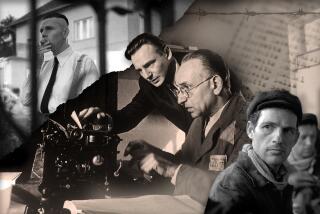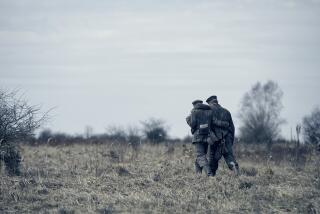‘Ryan’ Marches Through Germany
- Share via
BERLIN — Steven Spielberg’s “Saving Private Ryan” has stormed through its first week in German theaters to become one of the biggest films of the year, but viewers and reviewers alike attribute its success more to the director’s reputation than groundbreaking reflection on Germany’s role in the war.
“Der Soldat James Ryan,” as the German-dubbed version is titled, grossed more than $4 million at the box office in its opening week, drawing 600,000 viewers across this country that is among the world’s top three movie-going audiences.
But unlike the national soul-searching stimulated by Spielberg’s last World War II saga, “Schindler’s List,” German viewers see “Der Soldat” as a film that focuses more on the universal horrors of the war than on their own country’s culpability.
“It’s very powerful and makes you think about what hardships and sacrifices are endured in wars, but I don’t think it has any particular meaning for Germans,” said Thorsten Spethmann, a young advertising executive who viewed the film at Berlin’s popular Delphi cinema. “I didn’t come to see it out of any sense of shame. I came because it’s by Steven Spielberg and you go to see his films because they are now events in themselves.”
*
Diana Pasztor, another young German who took in the film at a late-night showing, ascribed its appeal to an “antiwar message” that has as much meaning for youthful Germans as those who lived through the conflict.
While “Der Soldat” lagged behind “Godzilla” and “The X-Files Movie” in first-week draws this year in Germany, the film’s war theme does ensure a strong box office here as young Europeans in general--and Germans in particular--have long shown keener interest in the continent’s 20th century history than Americans of the postwar generations.
Twelve million Germans died in the fighting triggered by dictator Adolf Hitler’s atrocious aggressions, and hardly a family in this country of 80 million remains untouched by memories of lost relatives and postwar ruin as well as the collective guilt bequeathed by the war.
The impressive opening week came despite the judgment of German film critics that “Der Soldat” offers little new in the genre of war films.
“Is it really memorable that public relations stunts for the home front were also part of the Second World War?” wondered Brigitte Werneburg, film reviewer for Berlin’s daily Tageszeitung, deeming the movie’s search for the sole surviving son of an Iowa farm woman the only distinctive feature among hundreds of films over half a century that have explored every aspect of the war.
*
Likewise, Berliner Zeitung critic Ulf C. Goettges shot down viewers’ expectations that the latest Spielberg offering must match “Schindler” for new insight into the horrors of war.
“Miserable, painful death, disguised as educational shock therapy, bring to mind many other war films,” Goettges observed, while praising the graphic D-day landing scene for its technical wizardry and raw power.
But he disputed that “Der Soldat” should be considered an antiwar film.
“To be able to make a true antiwar film, Spielberg would have had to abandon its patriotic pose,” wrote the reviewer, noting that this film repeats the oft-told moral that personal sacrifice among the good is necessary to defeat evil.
Despite the German critics’ misgivings about the cinematic significance of “Der Soldat,” German filmgoers have demonstrated their will to make their own judgments.
“We all want to see Spielberg’s films, especially those about important events in our history,” said Kirsten Wegener, a 35-year-old architect. “In Germany, people have to be more mindful of the past. The only good thing we can make of that part of our history is to learn from it.”
More to Read
Only good movies
Get the Indie Focus newsletter, Mark Olsen's weekly guide to the world of cinema.
You may occasionally receive promotional content from the Los Angeles Times.








